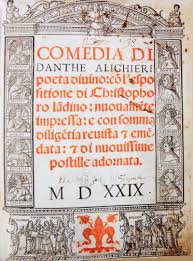The 14th century was dominated by three great Italian authors, Dante, Petrarch and Boccaccio. Dante Alighieri (1265-1321) formed himself as a poet in the school of the Dolce Stil Novo (Vita Nova). Dante also grew his culture with philosophical ( Convivio [=Banquet of knowledge]), linguistic (De Vulgari Eloquentia [=Eloquence in the Vernacular]) and political studies (Monarchia [=The Monarchy]). He is well known for the Divine Comedy, the synthesis of all Medieval thinking, and considered one of the masterpieces of the world’s best literature.
The Divine Comedy is an allegorical poem started presumably around 1307 and concluded during the years of exile at Ravenna. It is divided into three parts (Hell, Purgatory and Paradise), each divided into 33 cantos written in stanzas of three hendecasyllables each, called terzine. The literal subject of the work is the author’s journey from this world to the next which began in 1300 ( when Pope Boniface VIII proclaimed a Jubilee Year) both accomplished under the guidance of Virgil in the first two Parts, and under the guidance of Beatrice and San Bernardo in Paradise.
 Allegorically, it is the human spiritual journey, guided by reason (Virgil) towards earthly happiness (symbolized by the Earthly Paradise and illuminated by the Revelation [Beatrice]), and towards eternal happiness ( The Paradise), as a place for contemplation on the mysteries of the Christian faith.
Allegorically, it is the human spiritual journey, guided by reason (Virgil) towards earthly happiness (symbolized by the Earthly Paradise and illuminated by the Revelation [Beatrice]), and towards eternal happiness ( The Paradise), as a place for contemplation on the mysteries of the Christian faith.